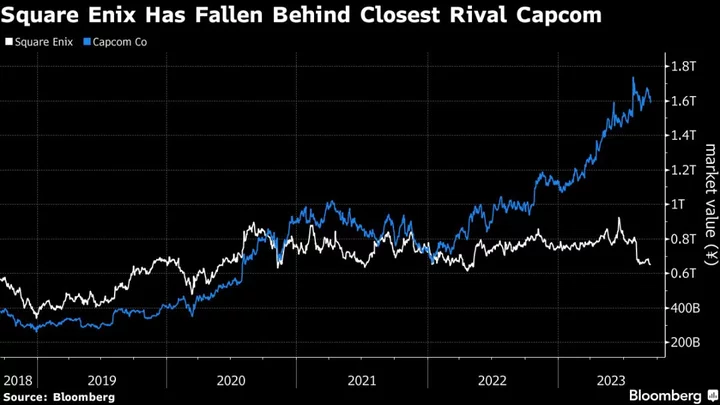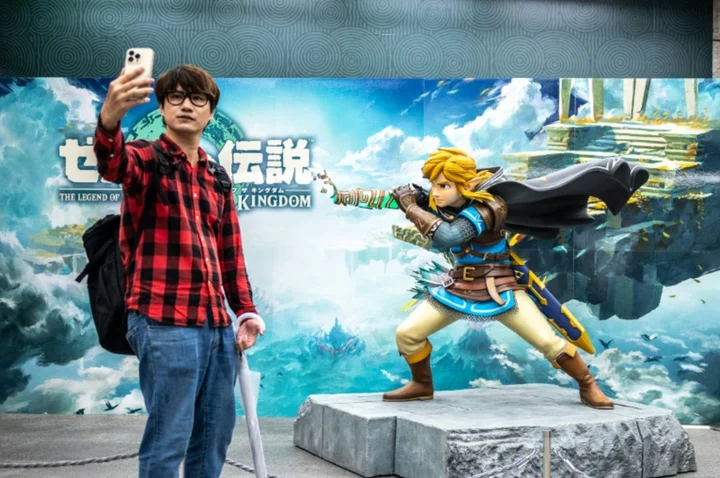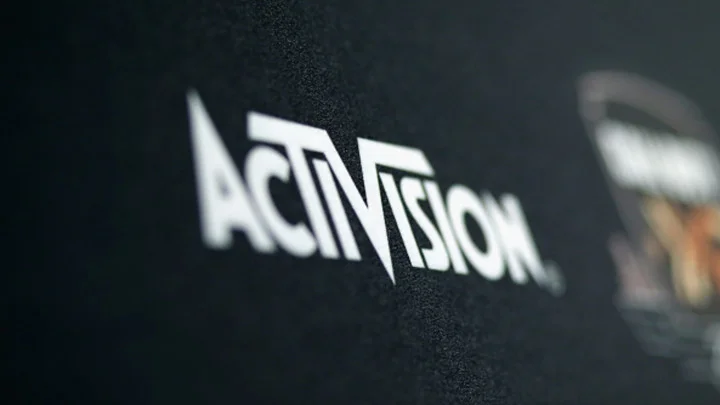Square Enix Holdings Co. has shed nearly $2 billion of its value since Final Fantasy XVI, the latest installment of its global hit series, came out to mixed reviews. Now investors wonder whether one of the games industry’s most remarkable runs is coming to an end.
The Tokyo-based firm has long relied on its feted franchise to supercharge growth — a formula that lifted its value five-fold in the decade leading to the launch of the latest Final Fantasy in June. But the game’s sales underwhelmed, and things got worse in August after the company reported a sharp profit decline. Shares plummeted by double digits, a dozen analysts tracking the stock cut their price target and long-term investor Sumitomo Mitsui Trust Asset Management Co. slashed its holdings in the game company.
One of the most recognized names among console and mobile gamers, Square Enix is on a streak of misfires in attempts to build another hit series to buttress sales, and it’s fallen behind rivals like Capcom Co. and Activision Blizzard Inc. in terms of market value. The company’s fall from grace offers hard lessons for the industry about the importance of quality control and product planning, said fans, analysts and developers who have done business at or with the studio.
“Flooding the market with unfinished, bad or untested games is a bad move,” Tokyo-based developer and gamer Michael Prefontaine said, listing Marvel’s Avengers, Forspoken and The DioField Chronicle as examples of poorly-thought-out games. “The company has overstretched itself on too many titles without proper oversight.”
Gamers have complained about mobile titles that seemed to have been rushed out the door and then shut down in a year or so, such as Bravely Default: Brilliant Lights and Echoes of Mana. Current and former Square Enix employees, asking not to be named as they’re not authorized to speak publicly, pin the blame for that on the company’s approach of making every game project a single producer’s fiefdom.
Producers are given full reign over the scope and direction of projects, and there’s a shortage of proper documentation and team structure, the people said. Contractors who’ve done work for Square Enix describe an ad hoc process where project goals can shift without warning.
The outcome is a high degree of volatility in the quality of the final product: some recent Square Enix games have earned rave reviews while others, such as multimillion-dollar flop Forspoken, have failed to find an audience.
Newly appointed Chief Executive Officer Takashi Kiryu, a 48-year-old Massachusetts Institute of Technology graduate who previously worked at Japan’s biggest advertising agency, has said he intends to whittle down the number of smaller titles and decrease outsourcing to focus on big-budget games with higher potential to improve the company’s profitability. The studio that made Forspoken was integrated into Square Enix after that title’s underwhelming performance.
Read more: ‘Final Fantasy XVI’ Reinvents the Franchise for the PS5
But analysts question how effective any changes in product strategy would be without altering internal practices.
“We remain concerned with the company’s game development structure and game quality control, which could limit the longer term performance,” Macquarie Capital Securities Japan analyst Yijia Zhai wrote in a letter to clients, while maintaining an an outperform rating on the company.
“Square Enix has problems with their games output,” said Serkan Toto, a Tokyo-based industry consultant, who said too many of the company’s games are “kind of conventional” and don’t aspire to become blockbusters. “These titles get a 70% rating on Metacritic, are kind of OK and are just very forgettable.”
A Square Enix spokesman did not respond to a request for comment.
The company has begun overhauling how it assigns producers, one of the contractors said. While game quality management remains a risk, the studio can bank on its legacy franchises for the time being, according to MST Financial analyst David Gibson. Square Enix has a loyal following of fans for its established titles and it can keep churning those out across new platforms to maintain sales for a while, Gibson said.
The company released a new mobile Final Fantasy VII game last week, but sales fell short of investor expectations. Square Enix’s stock have lost about 30% from its peak this year and on Wednesday was on track to close at its lowest since May last year.
Read more: Square Enix Drops After Final Fantasy and Mobile Setback
Rebuilding the storied maker of role-playing games would take years and there’s little hope of large upside potential on earnings in the near term, said UBS Securities analyst Kenji Fukuyama. The company has rested on its laurels for too long and may have already exhausted the patience of loyal fans, who are growing tired of seeing old games reissued on mobile platforms, he said. The failure to spark a third major franchise beyond Final Fantasy and Dragon Quest is key to this skepticism.
“Even if we look five years ahead, there isn’t much that can make investors confident about the company’s future,” Fukuyama said.
--With assistance from Mayumi Negishi.









